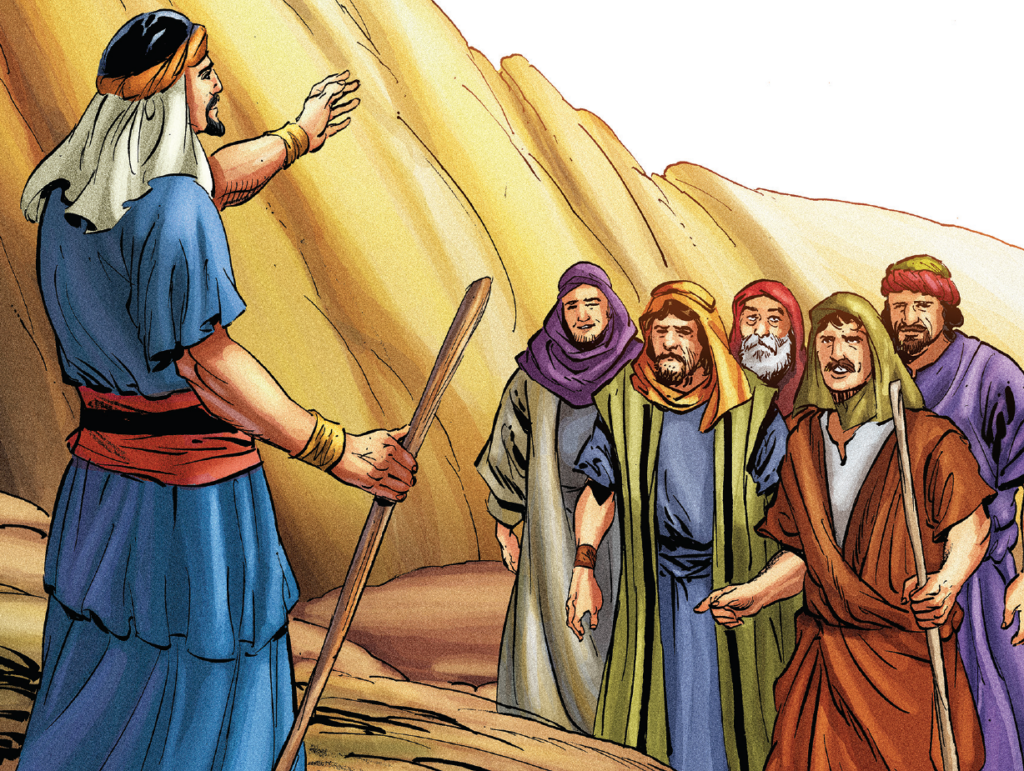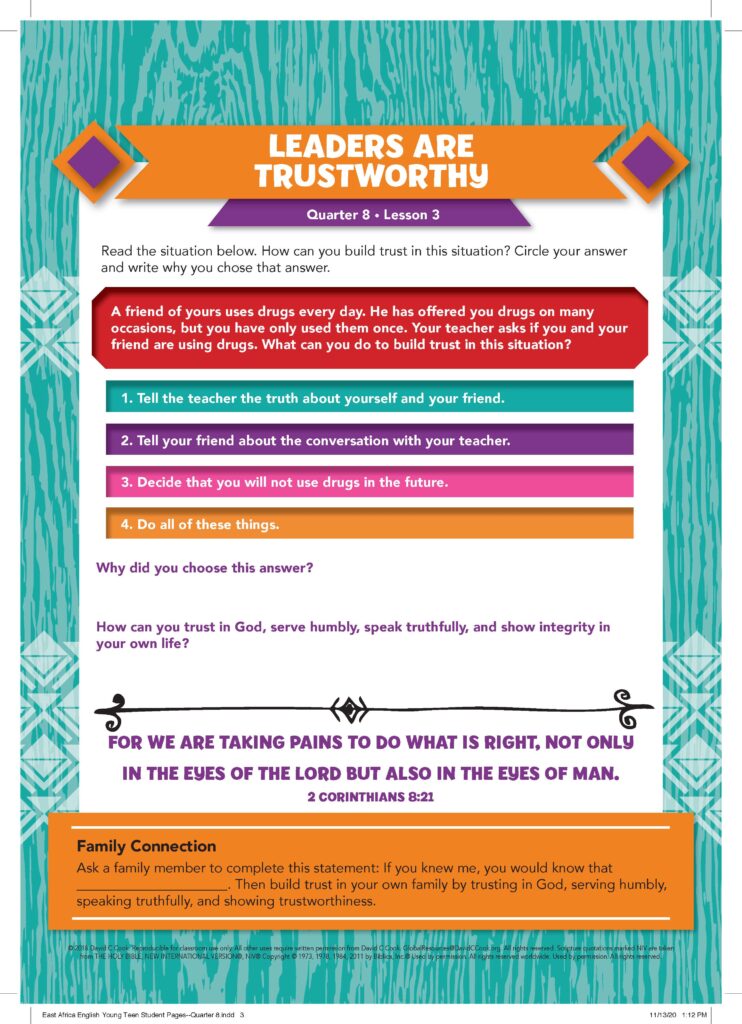During the lesson, the information for you to know is written in regular type, and what we suggest speaking or reading aloud to children is in bold. All resources for this lesson, including the Teacher Guide, Student Page, Family Connection Card, and other resources can be downloaded in a ZIP file by clicking on the following link:
In some lessons you will find "resource articles." These are articles written by experts from around the world to help equip you for your work with children and adolescents. Share them with parents or guardians if you consider it appropriate.
Whatever you have commanded us we will do, and wherever you send us we will go. Just as we fully obeyed Moses, so we will obey you. Only may the LORD your God be with you as he was with Moses.
Joshua 1:16–17
Joshua had grown up in the shadow of Moses. As Moses’ helper and successor, he was well-known to the Israelites. And when he assumed command of the Lord’s army and leadership of God’s people, they immediately pledged their allegiance to him. But this trust was not built overnight. Joshua had lived a life of godly character that removed any doubts the Israelites may have had about his leadership. Because of this, they responded positively, even when he asked them to do things that may have seemed surprising.
Do others trust you as the Israelites trusted Joshua? Have you proven through your words and actions that you are trustworthy? Ask God to show you the areas in your life where you need to earn the trust of others. Then begin to work on 1 of those areas. You may be surprised by the ways God can use you to lead when you trust in Him and earn the trust of others.
Encourage the students to ask their family members to complete this statement: If you knew me, you would know that ______________________. They can then build trust in their own families by trusting in God, serving humbly, speaking truthfully, and showing integrity.
Teacher Tip: If possible, email or text the Family Connection Card to the families of your students.
Greet the students as they arrive. Use each teen’s name if possible, and share with each of them 1 leadership skill you have observed in him or her. Showing that you know the students well and care about them will help to build trust.
Have the students form 2 lines facing each other. Tell them to extend their arms straight out in front of them to create a pathway. The lines should be close enough so that the fingertips of the teens in 1 line are overlapping the wrists of the teens in the other line. They should keep their arms extended. If you have more than 20 teens, they can form 2 sets of lines.
Choose the 2 teens to start the game as the walkers. One at a time, they will try to walk quickly through the pathway between the 2 lines. As they pass by, a teen with his arms extended in front of him will raise his arms to allow the walker to pass. The object of the activity is for the teens in the lines to keep their arms extended in front of them until they need to raise their arms to let the walker pass. They will then move their arms back into position in front of them as soon as the walker passes.
Once both the walkers have made it through the pathway to the other end of the line, they will join their line and extend their arms. Continue this process until all the teens have had an opportunity to walk through the pathway.
Then repeat the activity and ask the teens to run through the pathway. The faster they move, the more they will need to trust that the teens creating the pathway will move their arms at the right time. After you have finished the activity, have the class sit down for a discussion.
What did this activity teach you about the other students in this class?
Students may share answers such as some are bolder than others, some are faster than others, or some like to joke or tease others.
Was it easier or were you more confident when you did the activity the second time? Why or why not?
Students may answer that it was easier the second time because they trusted that the other students would move their arms and they were not worried about running into others’ arms.
This activity helps to build trust. In order to move quickly through the pathway of arms, you needed to trust that the other students would move their arms out of the way at the right times. When a student did not move her arms, your progress was stopped. You could not continue down the pathway until that student moved her arms.
Trust is an important leadership skill. When people do not trust their leader, they may choose not to follow his directions. And when a leader does not behave in trustworthy ways, it is often difficult to accomplish a goal because people will not want to follow her.
Today we will learn about trust from the story of Joshua. We have learned about Joshua before. He led the Israelites as they conquered the land God had promised them.
There are some important reasons that leaders need to build trust with those they lead and serve. Here are a few of them:
Listen to what the Bible tells us about the importance of building trust. We read this verse before when we talked about the servants who were given talents by their master.
Have a student read Luke 16:10 aloud from the Bible. If that is not possible, the verse is printed here for you.
Whoever can be trusted with very little can also be trusted with much, and whoever is dishonest with very little will also be dishonest with much.
Luke 16:10
What does this verse tell us about trust?
Trust is built by showing trustworthiness in everything. When a person is trustworthy with something small, others may be more willing to trust that person with larger things.
There are some important skills leaders need to have in order to build trust with those they serve and lead. The Bible teaches us many of these skills. Listen as I read these verses, and tell me what leadership skills they teach that help to build trust.
Blessed are those whose ways are blameless, who walk according to the law of the Lord!
Psalm 119:1
What does this verse teach us about being trustworthy leaders?
Trustworthy leaders walk according to the law of the Lord.
If you are using the Memory Verse Poster, show it to the students.
For we are taking pains to do what is right, not only in the eyes of the Lord but also in the eyes of man.
2 Corinthians 8:21

What does this verse teach us about being trustworthy leaders?
We should try to do what is right in the eyes of both God and to man.
A good name is more desirable than great riches; to be esteemed is better than silver or gold.
Proverbs 22:1
What does this verse teach us about being trustworthy leaders?
Reputation is more valuable than wealth, so it is important to be trustworthy.
The Bible tells us that it is important to follow God, show others that we are trustworthy, and consider our reputations in order to earn the trust of others.
What other leadership skills have we learned about that can help to build trust?
Practice servant leadership and use your gifts to lead and serve.
Joshua earned the trust of those he led by being a godly leader. As we read what the Bible tells us about Joshua, pay attention to what he did that made him a trustworthy leader.
Optional: If you are using The NIV Action Study Bible, the teens can read about Joshua in the “God in Action,” “People in Action,” and “Faith in Action” sections at the beginning of the book of Joshua.
When the Israelites first arrived at the Promised Land, another group of people was living there. So Moses sent 12 spies, including Joshua, to collect information to help him decide how to conquer the Promised Land. Most of the spies told Moses that the people living in the Promised Land were strong and nearly impossible to defeat. But listen to what Joshua and another spy told Moses and the people of Israel.
The land we passed through and explored is exceedingly good. If the Lord is pleased with us, he will lead us into that land, a land flowing with milk and honey, and will give it to us. Only do not rebel against the Lord. And do not be afraid of the people of the land, because we will devour them. Their protection is gone, but the Lord is with us. Do not be afraid of them.
Numbers 14:7–9
What leadership qualities did Joshua show that would build trust with the Israelites?
He trusted in God, served humbly, and spoke truthfully.
Joshua had learned many things from Moses. The Bible tells us that when Moses worshipped God, Joshua worshipped with him. Joshua learned that trusting God was an important skill for a good leader.
Joshua also served humbly. He had served Moses for many years, doing whatever Moses told him to do, including spying out the Promised Land. When Joshua returned, he spoke truthfully when he shared what he had discovered. He told the Israelites about the Promised Land and expressed confidence that they could conquer it with God’s help.
Because the people did not trust God, they turned away from the Promised Land and wandered in the wilderness for 40 years. Moses led the people during this time, with Joshua by his side. But God had told Moses he would die before the Israelites reached the Promised Land. God told Moses that Joshua would be the next leader of the Israelites. Joshua had been helping Moses for many years. When the people heard that Joshua was their new leader, this is what they said.
Have a student read Joshua 1:16–18 aloud from the Bible. If that is not possible, the verses are printed here for you.
Optional: If possible, share the image from The Action Bible.

Whatever you have commanded us we will do, and wherever you send us we will go. Just as we fully obeyed Moses, so we will obey you. Only may the Lord your God be with you as he was with Moses.
Joshua 1:16–17
What does this response tell us about how the people of Israel trusted Joshua?
They were willing to obey and follow him. They trusted that he would lead them well.
Joshua earned the people’s trust by following God, serving humbly, speaking truthfully, and showing that he was reliable. Joshua also showed the Israelites through his actions and his words that he was worthy of their trust. He lived in a way that showed others he was a man of character and integrity.
Before the Israelites could enter the Promised Land, they had to conquer the city of Jericho. Before the battle, Joshua sent spies to find out more about the city. They stayed at the house of a woman named Rahab. She hid the spies while they were in the city and helped them to escape. In return, the spies promised to protect Rahab and her family when the city fell.
Joshua and the Israelites were ready to conquer the city of Jericho. The walls of the city were high, and Jericho’s army was well prepared for battle. But God gave Joshua specific directions about how to conquer the city. God told Joshua to have the people march around the city wall once a day. They were to repeat this for 6 days. On the seventh day, they were to march around the city 7 times while the priests blew the trumpets. When a long blast sounded, the people would shout and the walls would fall down.
If Joshua had given you these strange orders, would you have listened? Why or why not?
Allow 2–3 students to share their thoughts. Be sure the teens mention that the Israelites were willing to follow Joshua’s orders because they trusted him.
What leadership skills did Joshua use to build trust?
He trusted God and spoke clearly, confidently, and truthfully.
What do you think might have happened if the Israelites had not trusted Joshua?
They might not have succeeded in the battle because they might not have obeyed God’s commands.
Because they trusted his leadership the people of Israel did as Joshua had commanded, even though his orders were surprising. They also knew he trusted in God and was obeying God’s commands. They had seen that he was a trustworthy leader. And because Joshua and the Israelites trusted in God, the walls of Jericho fell.
Remember how the spies had promised to protect Rahab and her family when they conquered Jericho? When the Israelites conquered the city, Joshua told his men to bring Rahab and her family out safely. Joshua did what he had promised.
What leadership skills did Joshua use?
He showed that he was trustworthy.
How could this situation have helped the Israelites to trust Joshua?
They would understand that he did as he had promised and that he cared for others.
Because Joshua trusted God, served humbly, spoke truthfully, and showed that he was a man of integrity, the Israelites trusted him.
Have the students form groups of 5–6. Have the groups do the following activity. Remind them to try to use the leadership qualities that help to build trust: trust in God, serve humbly, speak truthfully, and show integrity.
Listen to this situation and some possible responses. As a group talk about how can you build trust in this situation.
A friend of yours uses drugs every day. He has offered you drugs on many occasions, but you have only used them once. Your teacher asks if you and your friend are using drugs. What can you do to build trust in this situation?
Why did you choose this answer?
Optional: If you are using the Student Pages, give the students time to complete their pages.

In your group, each of you will complete the following statement: If you knew me, you would know that I _____________. You may share anything you want about yourselves. For example, I might say, “If you knew me, you would know that rain makes me sad.” To build trust with your group, do not share what is said with others outside your group.
Give the teens 3–4 minutes to complete this activity.
Now we will do this again. This time, share something that is more personal. For example, I might say, “If you knew me, you would know that my mother died recently.” Again, remember not to share what is said with others outside of your group.
Allow 5–6 minutes to do this activity.
Activities like this one can help you to build trust. When you trust in God, serve humbly, speak truthfully, and show that you have integrity, others will begin to trust you more. Listen again to this verse we read earlier.
For we are taking pains to do what is right, not only in the eyes of the Lord but also in the eyes of man.
2 Corinthians 8:21
What is an area of your life where you can choose to do what is right in the sight of man
and God?
How can you build trust in this area of your life?
How can trusting God, serving humbly, speaking truthfully, and showing integrity help you to build trust in this area?
Allow the teens to share their answers with their groups if they want to. Then close with a blessing based on 2 Corinthians 8:21:
Blessing: As you lead and serve others, may you take pains to do what is right not only in the eyes of the Lord but also in the eyes of man. May you begin to build trust so that others will see your leadership qualities and give you new opportunities to serve.
Lead the children in singing this quarter’s song, if possible.
Life on Life ©2020 David C Cook. Reproducible for home or classroom use only. All other uses require written permission from David C Cook [email protected]. All rights reserved.